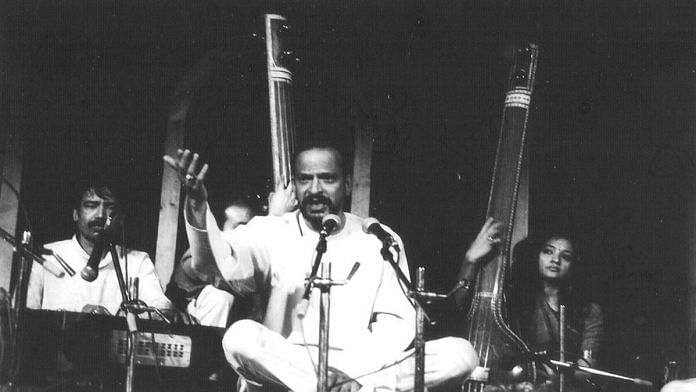New Delhi: When Hindustani vocalist Pandit Rajshekhar Mansur passed away at the age of 80 last month, his fans couldn’t believe it. A music genius and a professor of English literature, he emerged as an unlikely maestro of Jaipur-Atrauli Gharana — a music apprenticeship fraternity founded by Alladiya Khan in the late 19th Century.
Rajshekhar died at a private hospital in Bengaluru on 1 May. He was survived by his wife and three daughters.
“Found out a couple of days ago, that Pt. Rajshekhar Mansur is no more. He passed away on May 1, this year. How did we miss this news, we will dwell on it later. For now, mourning his death and celebrating his music with this father-son recording,” Abhinandita Mathur, a leader of the Aam Aadmi Party, wrote in a tweet Saturday.
The son and disciple of legendary classical vocalist Mallikarjun Mansur in Dharwad, Karnataka, Rajshekhar had begun formal training at the age of 16 under his father — relatively late in life because his father didn’t want him to suffer the hardships of earning a livelihood as a musician. Mallikarjun wanted him — the only son among his seven children — to take up lucrative professions like medicine or engineering, Rajshekhar chose English literature since he believed it was closest to being a musician.
What’s interesting is that Rajshekhar didn’t pursue music full-time until his retirement — he was a professor of English literature at the Karnatak University in Dharwad for 35 years although he continued to perform at concerts.
Also Read: EDM singer-songwriter Ritviz’s story shows what ‘creative courage’ means—life as a canvas
Musical beginnings under ‘father-guru’
It was only when Mallikarjun heard the 16-year-old Rajshekhar singing Malkauns at an annual class day event in college that Mallikarjun had first realised his son’s talent. Despite his father’s misgivings, Rajshekhar, it turned out, had cultivated his musical talent by hearing his father perform.
It was at that time that his father decided it was time to formally train his talented son, immersing him further into the nuances of the Jaipur Atrauli Gharana.
Rajshekhar was a believer in “guru-shishya (teacher-disciple) interaction”, which forms the basis of the Jaipur Atrauli Gharana, a system of singing that he described as “a well-guarded family secret”.
“Old masters rightly believed that music is a ‘Shravana Vidya’, a Vidya of diligent and careful listening. As the learner progressed, the guru would draw his attention to the subtle nuances which could not be spelt out but only carefully heard and imbibed,” he had written in a blog post in 2015. “When the learners had become sufficiently versed in the Gharana way of singing, they strutted about in the mantle of the Gharana which they carried with great loyalty and dedication.”
Rajshekhar continued to perform for 30 years at prestigious festivals and several All India Radio and Doordarshan national programmes while keeping alive the Jaipur Atrauli tradition in his concerts by rendering ragas such as Ramsakh, Lacchasakh, Goundgiri Malhar, Dhawalashri, among others.
“As his literature student at Karnatak University, I saw Rajshekhar struggling to strike a balance between being a professor of English and a musician. When he joined the department, he was cautioned by his scholar-teacher and the then head of the department about riding the two horses — music and literature,” wrote Professor N.S. Gundur in a piece dedicated to Rajshekhar. “But for Rajshekhar, music was not a horse to ride but a unicorn to be understood and explored, and thus he always saw himself as saadhak, a seeker.”
(Edited by Uttara Ramaswamy)
Also Read: Poet Kaka Hathrasi’s music magazine, Sangeet, struggling, not in tune with times



